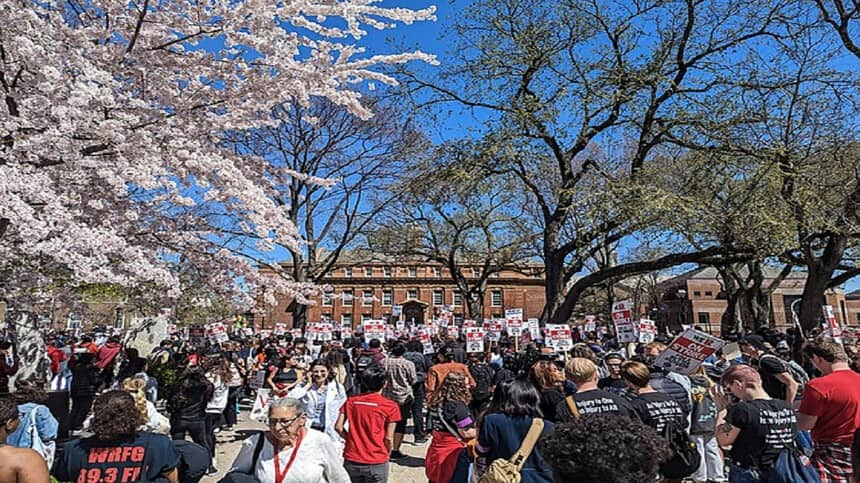Rutgers University rules out separate prohibition against caste-based discrimination
Press Trust of India | January 15, 2025 | 07:15 AM IST | 3 mins read
Rutgers University has determined that current university policy and protected class categories provide protections against caste discrimination.

WASHINGTON: The Rutgers University in New Jersey has ruled out creating a separate prohibition category against caste-based discrimination, arguing that it was already covered under its existing non-discriminatory policy. Hindu grassroots advocacy and civil rights groups welcomed the decision of the university, which has a large number of Indian-American students and those from India.
"After careful review, the university has determined that current university policy and protected class categories provide protections against caste discrimination," Rutgers said in a statement.
Rutgers set up a Task Force on Caste Discrimination in response to an agreement between the university and the American Association of University Professors-American Federation of Teachers (AAUP-AFT) to form a joint committee to explore caste-based discrimination.
"Rutgers has taken the position that caste can and does fall within some, or all, of those classes, depending on the factual circumstances," the university said and added that these categories included religion, ancestry, national origin and race. "Because caste is already covered by the Policy Prohibiting Discrimination and Harassment, the university will not be taking steps to amend this policy at this time," it said.
Non-discriminatory policy
The Office of University Equity and Inclusion conducts regular campus climate surveys, Rutgers said and added it would include questions related to caste discrimination. Reacting to the decision, Hindu American Foundation executive director Suhag Shukla said, "We applaud Rutgers for its decision restating existing university policy already protects against caste discrimination."
"We will also continue to monitor closely any trainings or surveys the Rutgers administration conducts to ensure that students are not treated differently on the basis of their race, ethnicity or religion, and that south Asian and Hindu-American students are not falsely or negatively stereotyped as a matter of policy or process," he added.
The Coalition of Hindus of North America (CoHNA) also welcomed the decision and said Rutgers agreed with its position that caste discrimination was already covered under existing categories of the university's non-discriminatory policy. This decision came in response to a campaign being run by a handful of privileged students and elite professors at Rutgers, with an extensive track record of falsifying Hindu traditions and targeting its deities and traditions, CoHNA said in a statement.
"I am glad that the Rutgers University Labor Relations Office recognised that caste is already covered under its current policy and did not fall for the report by the task force, which singled out Hindu students and faculty," said Hitesh Trivedi, associate Hindu chaplain at Rutgers. In a recent study, Rutgers' Social Perception Lab confirmed that adding caste to its policy would increase suspicion and hate towards Hindus and Indian-Americans, he said.
Also read Studying abroad is about ‘taking responsibility’, growth and adaptability, says Macquarie University
No proof of caste discrimination
CoHNA president Nikunj Trivedi said, "As a Rutgers alumnus and someone who has been active in the alumni community, I am pleased to see a decision grounded in reason and facts versus the emotions of a small privileged set of activists."
In 2023, a lawsuit filed by the state of California against two Indian-American engineers at Cisco for alleged caste discrimination was ignominiously withdrawn "with prejudice" -- a move that revealed how the case lacked any basis in reality and how close the California Civil Rights Department came to being sanctioned by California courts, CoHNA said.
"The only other piece of supposed evidence offered has been the 'survey' from Equality Labs, which was also rejected by California courts as inadmissible given its lack of scientific basis. Like the academics at Rutgers, many had used the unproven allegations against Cisco, as proof of guilt and indicted the entire Hindu-American community as a result," it said.
CoHNA asserted that despite almost a decade of investigation, there was no proof of systemic caste discrimination in the US. "Yet, elite academics and privileged activists continue to use taxpayer funds to push their personal opinions and causes, over and over again," it added.
Follow us for the latest education news on colleges and universities, admission, courses, exams, research, education policies, study abroad and more..
To get in touch, write to us at news@careers360.com.